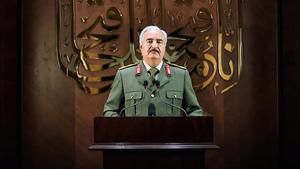 This image grab taken from a video published by the War Information Division of military strongman Khalifa Haftar's self-proclaimed Libyan National Army (LNA) on April 28, 2020 shows Haftar giving a speech, saying he had "a popular mandate" to govern the country, declaring a key 2015 political deal over and vowing to press his assault to seize Tripoli. (LNA WAR INFORMATION DIVISION / AFP)
This image grab taken from a video published by the War Information Division of military strongman Khalifa Haftar's self-proclaimed Libyan National Army (LNA) on April 28, 2020 shows Haftar giving a speech, saying he had "a popular mandate" to govern the country, declaring a key 2015 political deal over and vowing to press his assault to seize Tripoli. (LNA WAR INFORMATION DIVISION / AFP)
UNITED NATIONS / PARIS - The Libyan Political Agreement remains the framework for governance in Libya despite the claim of Libyan National Army (LNA) commander Khalifa Haftar's that he was the country’s new ruler, a United Nations (UN) spokesman said on Tuesday.
Haftar announced in a televised speech on Monday that he had the “popular mandate” to rule over the country, apparently brushing aside the civilian authorities which nominally govern eastern Libya
"Any political change must take place through democratic means, not through any military means," said Stephane Dujarric, spokesman for UN Secretary-General Antonio Guterres.
"We've, obviously, been concerned by the ongoing situation there," he added.
Dujarric said the secretary-general's Acting Special Representative Stephanie Turco Williams has been in touch with leaders of the internationally-recognized Government of National Accord (GNA) in Tripoli. Williams also spoke to the head of the Tobruk-based House of Representatives and other leaders.
"I think her message is clear, that the Libyan Political Agreement and the institutions that emanate from it remain the sole internationally recognized framework of governance in Libya, and that's very much in line with the Security Council resolutions, and that any political change must take place through democratic means, not through any military means," the spokesman said.
ALSO READ: Ifax: Russia disapproves of Haftar's power grab in Libya
In December 2015, Libyan rival parties signed a political agreement in Morocco that recognized the UN-backed GNA, in an attempt to end the state of political division in the country. However, Libya remains politically divided between eastern and western governments competing for dominance.
Haftar announced in a televised speech on Monday that he was canceling the UN-sponsored political agreement, adding that he had a “popular mandate” to rule over the country, apparently brushing aside the civilian authorities which nominally govern eastern Libya.
Haftar's eastern-based army has been leading a military campaign in and around the capital Tripoli, attempting to take over the city and topple the rival UN-backed government.
READ MORE: Libya govt, Haftar's forces dim hopes of salvaging UN ceasefire talks
France said on Tuesday that the Libyan conflict could not be solved through unilateral decisions, but only under UN-backed dialogue after Haftar’s move to seize control of the country.
“The solution to the Libyan conflict can only go through dialogue between the parties under the aegis of the United Nations, not through unilateral decisions,” Foreign ministry deputy spokesman Olivier Gauvin said in a statement that made no direct reference to Haftar.
“There is no alternative to an inclusive political solution, as part of the conclusions of the Berlin conference,” he said.


